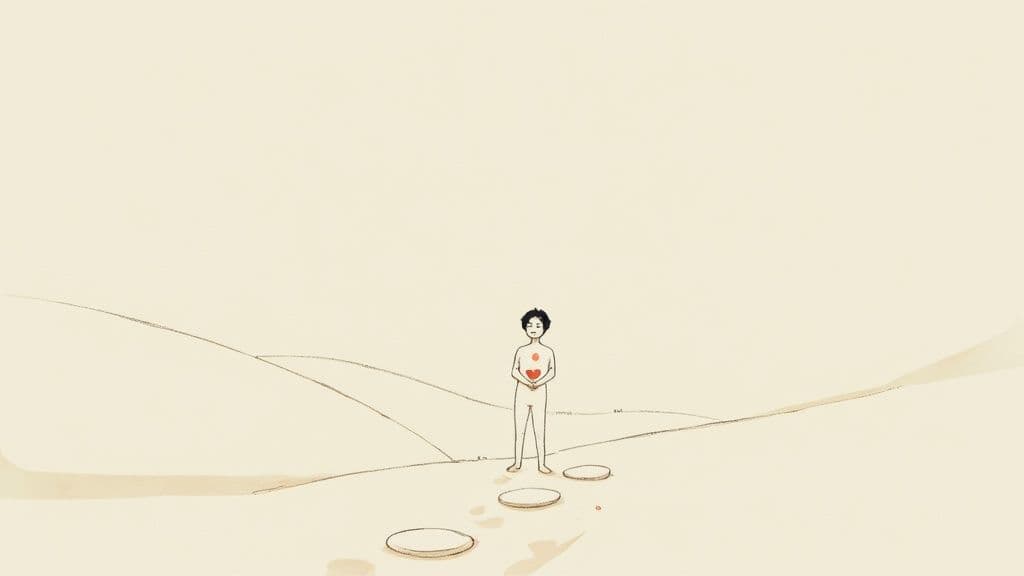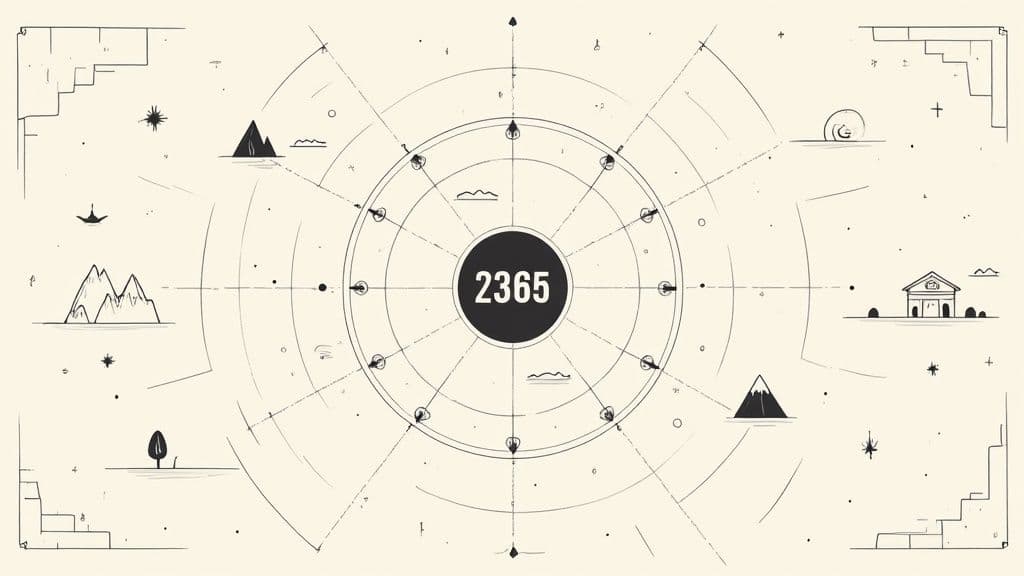Feeling lost? Discover what to do when you feel lost with actionable advice on finding clarity, reconnecting with yourself, and creating a life with purpose.
November 27, 2025 (Today)
What to Do When You Feel Lost A Practical Guide
Feeling lost? Discover what to do when you feel lost with actionable advice on finding clarity, reconnecting with yourself, and creating a life with purpose.
← Back to blog
What to Do When You Feel Lost: Practical Steps
Summary: Feeling lost? Practical, science-backed steps to find clarity, reconnect with your values, and take small actions toward a purposeful life.
Feeling lost? You’re not alone. This guide offers immediate grounding practices, reflection exercises to reconnect with your inner compass, and small experiments to help you move toward a clearer, more purposeful life.
Your First Gentle Steps When Feeling Adrift

Feeling untethered is a deeply human experience. It can feel like navigating dense fog without a map or compass. The urge to scramble for an immediate answer or to numb the feeling is strong, but the most helpful first move is simple: pause and breathe.
This feeling isn’t a flaw or a sign of failure. Think of it as a signal — an invitation from yourself to check in and see what needs attention. Instead of fighting the uncertainty, acknowledge it without judgment.
Create a Pocket of Calm
Your mind is likely racing with a million “what ifs” and “shoulds.” Before you can sort through that noise, carve out a small pocket of calm. This isn’t about solving life’s big questions in five minutes. It’s about creating enough space to breathe and think more clearly.
When you’re overwhelmed, trying to tackle the big picture only adds to the stress. Here are a few micro-actions that can pull you back to the present and give you a foothold.
- Take a five-minute walk. Leave your phone behind. Focus on the feeling of your feet meeting the ground and the air on your skin.
- Try a two-minute breathing reset. Find a quiet spot and inhale slowly, exhale slowly. This simple act can interrupt anxious loops and lower stress.1
- Engage your senses. Make a cup of tea and treat it like a short ceremony. Notice the sound of the kettle, the warmth of the mug, the scent rising from the cup.
These aren’t distractions. They are grounding practices that tell your nervous system you’re safe in this moment. For more practices, see our guide to meditation for self-discovery.
Immediate Actions for Finding Your Footing
| Action | Why It Helps | Simple First Step |
|---|---|---|
| 5-Minute Sensory Walk | Interrupts mental loops by connecting you to your physical environment. | Walk to the end of your street and back, focusing on sights and sounds. |
| 2-Minute Breath Focus | Calms the nervous system and reduces panic. | Close your eyes and count four slow breaths in, four slow breaths out. |
| Mindful Hydration | Pulls your attention into a simple, tangible task. | Slowly drink a glass of water, noticing temperature and swallowing. |
The goal isn’t to find all the answers immediately. It’s to take one small step back toward solid ground so you can approach deeper questions from calm, not panic.
Reconnect With Your Inner Compass

When you feel lost, the signal from your inner compass has usually gone quiet. It isn’t broken — it’s been drowned out by external pressures, expectations, and daily noise. This stage isn’t about finding a brand-new map; it’s about learning to listen to yourself again.
Tune Into Your Past
Your past experiences hold clues about your authentic self. Moments of deep engagement and joy are breadcrumbs pointing back to your core passions and values. Treat those memories as data.
Grab a journal or open a blank document and respond to these prompts without overthinking:
- When did you last feel completely absorbed in something? What were you doing?
- What compliment stuck with you? Why did it matter?
- Describe a time you felt proud. What strengths did you draw on?
Patterns in your answers will point you toward work, hobbies, and environments where you naturally come alive.
Define Your Core Values
Values are the principles that should guide your decisions. When your actions fall out of sync with these values, feeling lost often follows. List the qualities essential to you: creativity, stability, adventure, community, independence. This list becomes a decision filter: “Does this align with my value of [e.g., adventure]?” If not, it may not be the right path.
For a deeper exercise, see our guide on how to discover your core values.
Discovering Your Life’s Unique Blueprint

Sometimes feeling lost is a sign that you’re on a path that isn’t really yours. It’s the quiet clash between daily life and who you truly are. A framework can help you understand your strengths, potential roadblocks, and purpose.
Author Dan Millman outlines a system in The Life You Were Born to Live that uses a “life number” derived from your birth date to highlight core themes and lessons. Discovering this blueprint can explain recurring challenges and why certain passions pull you so strongly.
Understanding Your Life Path
According to Millman’s framework, your life number points to themes and lessons tied to your nature. For example, someone with a creativity-focused path will likely feel drained in highly structured, analytical work. Shifting your question from “What’s wrong with me?” to “What is my path trying to teach me?” changes everything.
How to Find Your Life Number
The Life Purpose App automates this calculation and gives a clear breakdown of your life number and its themes. Enter your birth date to get insights you can use to guide decisions and check alignment with your values.
This approach complements the value-setting exercises above. As you begin living more in line with your blueprint, simple supporting practices can help reinforce clarity, such as exploring confidence-boosting rituals or tools.
You Are Not Alone in Feeling Lost
When you’re in the fog, it’s easy to feel isolated. But this is a common human experience. Around 970 million people worldwide are living with a mental health condition — a reminder that many people are navigating anxiety, depression, and uncertainty right now2. Global shortages of mental health workers also make support harder to access in many places3.
Knowing others share these struggles can shift your sense of failure into a sense of belonging. Reaching out isn’t weakness — it’s strength.
Ways to Find Support
- Trusted friends or family. Saying your feelings out loud can lift surprising weight.
- Community groups. Finding people who get it builds belonging.
- Professional guidance. Therapists, counselors, and coaches offer tools and perspective.
Accepting that your feelings are part of a larger human story opens the door to self-compassion and connection.
How to Take Small Steps in a New Direction

Clarity rarely arrives as a single flash. It’s built through small, intentional actions. When you’re feeling lost, the pressure to make a huge move can be paralyzing. Let go of that expectation and start with one tiny, non-intimidating step.
Small actions are experiments that gather real-world data about what resonates with you. They lower the stakes and remove the fear of making the “wrong” choice.
- Curious about a new career? Ask one person on LinkedIn for a 15-minute conversation.
- Thinking about volunteering? Try a single three-hour event first.
- Want to learn a skill? Watch a few free tutorials or sign up for a low-cost webinar.
For a structured way to plan experiments, try a personal development plan template that breaks big goals into manageable steps.
Common Questions About Finding Your Way
Is it normal to feel lost even when life looks good on paper?
Yes. Feeling lost often signals that your external life no longer matches your internal world. It can mean you’ve outgrown a situation and need to discover what fulfillment looks like now.
How long will it take to stop feeling lost?
There’s no set timeline. For some people, focused reflection and small actions clear the fog in weeks. For others, it unfolds over months. Aim to move through uncertainty with self-compassion and celebrate small “aha” moments.
When should I consider getting professional help?
Talk to a therapist or counselor if the feeling of being lost is tied to persistent anxiety or depression, if hopelessness affects daily life, or if even small steps feel impossible.
Frequently Asked Questions
Q: What’s the best first step when I feel overwhelmed?
A: Pause and do a two- to five-minute grounding practice — a short walk, focused breathing, or a sensory task to calm your nervous system.
Q: How do I figure out what I truly value?
A: Journal about moments when you felt fully engaged or proud. Look for repeating themes and turn those into a short list of core values.
Q: What if I try small steps and still feel stuck?
A: Reach out for support. Talk with friends, join a community group, or consult a therapist or coach for new perspectives.
Discover Your Life Purpose Today!
Unlock your true potential and find your life’s purpose.
